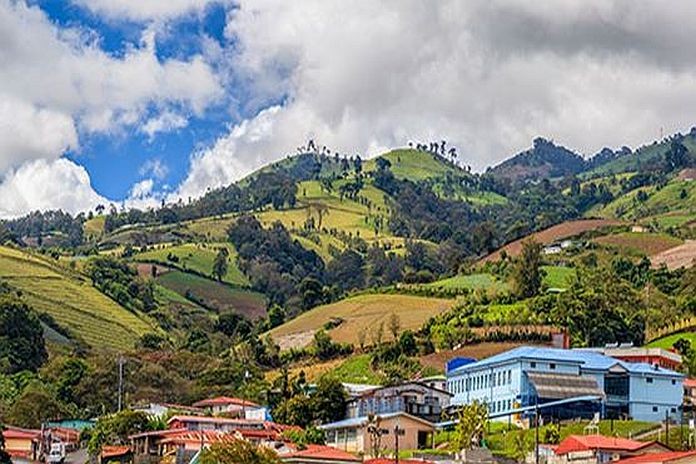By Analisa Bala
Pura vida, the “pure life.” It’s an expression you’ll often hear in Costa Rica. One that represents the laid-back lifestyle the country is known for and gives a sense of why Costa Ricans are as happy as they are.
“If you are healthy, have work, and are able to spend time with friends and family, you are pura vida,” says Luis Alberto Vásquez Castro, a former congressman for Costa Rica’s Limón province.
The 2021 World Happiness Report ranks Costa Rica the 16th happiest place on earth. Aside from the Czech Republic it is the only emerging market economy listed in the top 20. For a middle-income country, that’s a lot of happiness per GDP dollar.
Professor Mariano Rojas, a Costa Rican economist attributes the country’s high well-being to strong social relationships and a sense of community. “People are warm; the pace of life is slower. It’s not a competitive society where everyone is trying to climb the career ladder.”
The country also has a strong welfare system. Costa Ricans have access to free education and a guaranteed state pension. It is the only country in Central America where 100 percent of the population has access to electricity and a source of drinking water.
It is also one of the few countries in the region that offers universal health coverage.
Community-oriented primary health care
Costa Rica has prioritized public health for decades, investing heavily in targeting the most readily preventable kinds of death and disability. In the 1970s, the country spent more on health as a proportion of GDP than even some advanced economies, including the United Kingdom.
Those investments paid off. By 1985, the nation’s life expectancy was the longest in Latin America and matched that of the United States. Child mortality rates dropped from about 74 deaths per 1,000 in 1970 to 17 by 1989.
What sets Costa Rica apart, however, is its primary health care model.
Implemented in the 1990s, the model built on decades of experience with rural and community health programs, changing the culture of care delivery in the country. “It brings health to the communities,” says María del Rocío Sáenz Madrigal, Costa Rica’s former minister of health.
Every Costa Rican is assigned to an equipo básico de atención integral en salud (EBAIS) – a local primary health care team of physicians, nurses, and community health workers. Health workers visit each household annually in the area to which they’re assigned to assess needs. The data they gather are combined with electronic health records and used to set targets, track progress, and focus resources on higher-risk areas.
When the system was first introduced, EBAIS teams were sent to the country’s most medically underserved rural areas before expanding to urban centers. “That allowed the country to build a very robust information system on the determinants of health -the conditions in which people live,” says Sáenz Madrigal. “It goes beyond attending to the disease. Investment in health starts with improving the conditions and quality of people’s lives. It’s a very comprehensive vision of what health and wellness is.”
Evidence shows the model works. Life expectancy rose from 75 in 1990 to 80 (well above the US). An enviable health outcome, yet the country now spends less on health care as a percentage of GDP than the world average (7.3 percent versus 10 percent in 2017).
Rojas thinks access to primary care pays. “People who are happy live longer. That’s why you need to spend less. It’s not only that health contributes to happiness. Happiness contributes to health.”
Social pact
So which comes first – happiness or health? Sáenz Madrigal thinks that’s the wrong question.
“We have in Costa Rica what we call a social pact,” she says. “Regardless of the government that comes in, the one that follows must put in one more brick. The mistake we make many times is to say, ‘Everything that the previous government did is useless.’ It costs more to replace a brick than to build on one. That requires long-term vision and political will.”
Costa Rica has had a long democratic history of leaders who have made well-being a government priority. In 1869, the country became one of the first in the world to make primary school education both free and compulsory. Cristina Eguizábal, a political science professor, believes “Costa Rica has always had a very enlightened elite.”
“Costa Rican elites have been wise enough to maintain a certain level of well-being through a very robust fight against poverty,” she says. “Even though income inequality has widened, the percentage of people living in extreme poverty has fallen – until the COVID-19 crisis hit. That sense of security, empowerment, and equality is very important.”
And how did they become so wise? “Enlightenment has a dose of self-interest,” explains Eguizábal. “In the 1970s the country had one of the highest deforestation rates in Latin America. Energy in Costa Rica is mostly from hydropower, and dams were drying up. The government changed course because if it didn’t, the country would lose power.” Today, Costa Rica is a global green pioneer. “The greener your environment, the more jobs,” adds Eguizábal.
There is not just one, but many good reasons to be happy in Costa Rica, it seems.
Castro, the former congressman, confirms this: “Before being born, a Costa Rican is guaranteed life, education, food, social security, and the fact that he/she will only learn about war through a film…that is a country pura vida!”
Source: IMF News
Analisa Bala is on the staff of Finance & Development.
This article first appeared in the most recent issue of Finance & Development.





